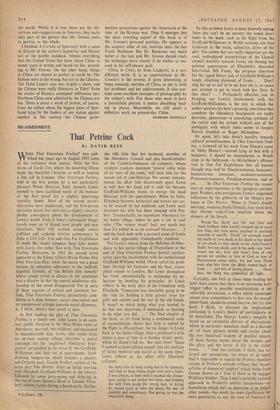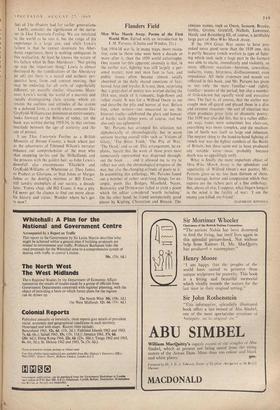RE-ASSESSMENT
That Petrine Cock
By DAVID REES
WHEN That Uncertain Feeling* was pub- lished ten years ago in August 1955 some of the reviewers were uneasy. After the fire-
works of Lucky Jim, where the deserving Dixon made the beautiful Christine as well as landing a fine job in London, That Uncertain Feeling,
told, in the first person by a not particularly pleasant Welsh librarian. John Aneurin Lewis, seemed to have sacrificed much of the humour of the first novel for a slightly depressing morality theme. Most of the second novel's characters were unpleasant, and the first-person narration meant that there was a slightly claustro- phobic atmosphere about the development of Lewis's world. Even if Amis's subsequent longer novels went on to dissect new people and new situations, ' there still seemed enough comic collision and sardonic interior commentary in Take a Girl Like You and One Fat Engliihman to make the reader compare these later noVels with Lucky Jim rather than with That Uncertain Feeling. Moreover, in 1962 the second novel appeared as the Sidney Gilliat/Bryan Forbes film Only Two Can Play; while the movie was a great success, its relentless adherence to the ineffable slapstick formula of 'the British film comedy' Where sexual virtue is always in the ascendant was a disaster in that the central adulterous rela- tionship of the novel disappeared. Yet in spite Of these vagaries of critical and cinematic for- tune, That Uncertain Feeling, distinctively com- bining as it does humour, social observation and an unequivocal attitude towards moral dilemmas, is, I think, Amis's best novel to date.
• At first reading the plot of That Uncertain Feeling is a simple one. John Lewis is an assis- tant public librarian in the West Wales town of Aberdarcy, married, two children, and marooned• in uncomfortable digs. Lewis, who comes from an up-state mining village, cherishes a genial contempt for the `anglicised Aberdarcy bour- geoisie' personified in the novel by the Gryffydd- Williamses and their set of quarrelsome, hard- drinking hangers-on, which includes a ghastly, sub-Dylanist poet, Gareth Probert, authm of the verse play The Martyr. After an initial meeting. with Elizabeth Gryffydd-Williams in the library, followed by some party-going and drinking in the out-of-town Queen's Head at Llansili, Eliza- beth seduces Lewis during a beach-party. Earlier,
*Gollancz, 18s. she tells him that her husband, member of the Aberdarcy Council and also board-member of the Cambrio-Sudanese oil company, whose catalytic crackers dominate `several cubic miles of air west of the town,' will back him for the vacant job of sub-librarian. No sooner consum- mated, the affair falls disastrously apart. Lewis is- told that the fixed job is only his because Gryffydd-Williams wants to enrage the head librarian with his appointment. When he balks, Elizabeth becomes hysterical and wrecks her car, to be rescued by her husband, and Lewis soon discovers his wife has been sleeping with Pro- bert. Traumatically, he repudiates Aberdarcy for his home village, where he gets a job in coal sales (The money wasn't bad; not much less than I'd pulled in as an assistant librarian . . .') and the book ends with a pastoral scene of Lewis and wife apparently triumphantly reunited, Yet Lewis's retreat from the Babylon of Aber- darcy to his native village of Fforestfawr at the end of That Uncertain Feeling doesn't satisfac- torily solve his involvement with the sophisticated Gryffydd-Williams world. Dixon solves his prob- lems through his fantasies and his final, trium- phant escape to London. But Lewis throughout has tried, unsuccessfully, to rationalise his be- haviour by bending his principles. As Lewis reflects in the early days of his friendship with Elizabeth, `Tomorrow was inevitably going to be the time for holding a little private levee for guilt and anxiety and the rest of the old bunch. It wasn't so much doing what you wanted to do that was important, I ruminated, as wanting to do what you did. . . .' The final chapter of the book, so far from being a sentimental coda of reconciliation, shows that little is solved by the flight to Fforestfawr, for no longer is Lewis back in the home village, than a professor's wife makes a pass at him in a Sunday drinks party, which he doesn't fall for. But next time? `Since I seemed to have piloted myself into the position of being immoral and moral at the same time,' Lewis reflects as his affair with Elizabeth collapses,
the thing was to keep trying not to be immoral, and then to keep trying might turn into a habit. .1 was always, at least until I reached the climac- teric, going to get pulled two Ways, and keeping the pull from going the wrong way, or trying to, would have to take the place, for me, of stability and consistency. Not giving up was the important thing. . . .
To this problem Lewis is most honestly saying, there just can't be an answer; the comic inter- ludes in the book, such as his flight from the Gryffydd-Williamses in Welsh costume, are thus irrelevant to the main, subjective, drive of the plot. The scenes that are really important are the cool, underplayed presentations of the Llansili crowd's hostility towards Lewis, the fleeting but pointed appearances of Elizabeth's discarded boy-friend, Bill Evans, the set-piece interview for the rigged library job, or Gryffydd-Williams's tough, clinching dismissal of Lewis . . . 'Don't ring her up or call in to see how she is, or make any attempt to get in touch with her. Ever. Is that clear? . . .' Particularly effective, too, in bringing out Lewis's involvement with the Gryffydd-Williamses, is the way in which the author presents his hero's growing conviction that somehow the Aberdarcy bourgeoisie are really desirable, glamorous—a convincing synthesis of the satiric and the serious without any of the ambiguity with which Amis seems to forgive Patrick Standish or Roger Micheldene.
Or again, let's take Amis's hostility towards cultural pretentiousness in That Uncertain Feel- ing, a leitmotif of his work from Dixon's curse of 'filthy Mozart'—uttered lying in bed with a
hangover, it should be remembered, as Welch sings in the bathroom—to Micheldene's affirma- tion in One Fat Englishman that all human thought may well be liberal-nonsense, humanist- humanitarian nonsense, academic-nonsense, Protestant-nonsense, Freudian-nonsense, and so on. . . In That Uncertain Feeling the reposi- tory of super-nonsense is the egregious pseudo- poet, Probert, who precipitates Lewis's anguished reflections by the gibberish of the Monk's pro- logue in The Martyr, 'When in Time's double morning, meaning death/Denial's four-eyed bird, that Petrine cock/Crew junction down the sleepers of the breath. . .
Words like 'death' and 'life' and 'love' and 'man' [reflects John Lewis] cropped up in every few lines, but were never attached to anything concrete or specific. 'Death' for example wasn't my death or your death or his death other death or our death or their death or my Aunt Fanny's death, but just death, and in the same way 'love' wasn't my etc., love and wasn't love of one person for another or love of God or love of blackcurrant puree either, but just love. There were also bits from the Bible turned back to front . . . and bits of daring jargon. . . . Dear, dear, the thing was symbolical all right. . . .
Certainly, one feels at times when reading the later Amis canon that there is an increasing hair- trigger reflex to possible manifestations of the culturally pretentious, a reflex which Sometimes causes even sympathisers to dive into the nearest plush-lined, mandarin-zoned burrow, but it's also hard, I think, to discount the implications contained in Lewis's the'dry of particularity as he demolishes The Martyr. Lewis's integrity is based on an existential distrust of abstractions, which in particular manifests itself as a distrust of 'all those phoney novels and stories about the wry rhetorical wisdom of poetical miners, all those boring myths about the wonder and the glory and the terror of life in the valley towns. . . .' And this attitude, I think, has en- larged our perceptions, for many of us today find it impossible to regard the Protean manifes- tations of Probert's attitude without that 'mono- syllable of demented laughter' which broke from Garnet Brown in I Like It Here as he engages Wulfstan Strether. Thus Lewis's carefully rational approach to Probert's artistic incoherence—an iconoclasm yvhich isn't as imprecise as in Amis's other novels—has much the same significance for one's generation as, say, the tone of Pruf rock or
that of The Orators had for earlier generations. Lastly, consider the significance of the narra- tor• in That Uncertain Feeling. We are restricted to the world as he sees it, but the range of his experience is a large one, and while "Lewis's failure is that he *cannot dominate his Aber- darcy experience, there is nothing ambiguous in this realisation. At least he knows the nature of his failure when he flees Aberdarcy: 'Not giving up was the important thing.' Lewis is almost destroyed by the ramifications of the Aberdarcy jet set; yet there is a moral and resthetic per- - spective here, form . and content meeting, that may be enduring for all sorts of superficially different, yet morally similar; situations. More- over, Lewis's world, the world of a necrotic and rapidly disintegrating class system, which yet retains the outlines and attitudes of the system in a debased form, a world where someone like Gryffydd-Williams can dominate an entire society, looks forward to the Britain of today, yet the book was written during 1953-54, in that curious interlude between the age of austerity and the age of protest.
I see That Uncertain Feeling as a British Memoirs of Hecate County, a book where just as the adventures of Edmund Wilson's narrator enhance our comprehension of the man who shot snapping turtles and the Milhollands and the princess with the golden hair, so John Lewis's downfall also encompasses 'Elizabeth and Gryffydd-Williams or Whetstone or Theo .James or Probert or Gloriana, or Stan Johns or Margot Johns or the dentists mistress or Bill Evans,' still tawdry exemplars of our society, a decade later. 'Funny chap, old Bill Evans; it was a pity I'd never got the chance to find out more about his history and status.' Wonder where he's got to now?































 Previous page
Previous page